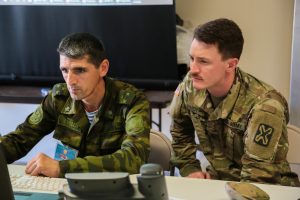Increased military cooperation between Uzbekistan and Tajikistan over the years underscores not only closer relations between the two states but their shared perception of threats emanating from Afghanistan. Meanwhile, U.S.-organized regional military exercises reiterate Washington’s ongoing concerns about security in South and Central Asia.
Recently concluded joint exercises and high-level meetings between Uzbekistan and Tajikistan are just another demonstration of closer functional ties between Tashkent and Dushanbe, despite differences in how each approaches the Taliban government in Afghanistan.
The “Commonwealth 2022” joint Tajik-Uzbek military exercises began on August 4 in Termez, Uzbekistan, on the border with Afghanistan. According to Uzbekistan’s Ministry of Defense, the exercises began in earnest with a welcome ceremony on August 5 with remarks from Major General Zaynobiddin Iminov, of Uzbekistan’s Southwestern Special Military District, and the Tajik Deputy Chief of the General Staff of the Armed Forces Major General Egamzod Sharof Khudoyberdi. National anthems were played and the participating forces marched through the training ground. The ceremony was followed by demonstrations by Uzbek military personnel and the day concluded with a football match.
The core of the exercises, however, focused on repelling a simulated violation of the two countries’ border, which the ministry said was “destroyed by precise strikes of machine gunners, tanks, artillery and other combat units.”
Neither ministry clarified in public statements how many participated in the exercises.
As the exercises neared their end, on August 9 Tajikistan’s Minister of Defense Colonel General Sherali Mirzo arrived in Tashkent to meet with Uzbekistan’s Minister of Defense Lieutenant General Bahodir Kurbanov.
Kurbanov, according to the ministry, “emphasized the friendly relations established between Uzbekistan and the Republic of Tajikistan” and “expressed confidence” about the further expansion of ties. The two sides noted cooperation across a variety of fields, from the political, economic, cultural, and humanitarian spheres to matters of defense and security.
An agreement was signed by the two ministers to organize the training of Tajik military personnel at Uzbek institutions.
Afghanistan does not seem to have been directly mentioned in relation to the exercises, but Central Asia’s southern neighbor looms large in all security discussions. Both Uzbekistan and Tajikistan have been targeted by rocket attacks from Afghanistan over the past few months, most believed to be fired by the Islamic State Khorasan (ISK). Vitriol in ISK-linked social media accounts in recent months, as Lucas Webber noted in an article last month for Eurasianet, has increasingly targeted the leaders of Tajikistan and Uzbekistan.
Tashkent and Dushanbe have taken different tones toward the Taliban, now in power in Kabul — the former engaging in direct talks and hosting conferences featuring Taliban officials and the latter refraining from direct engagement and allegedly harboring the National Resistance Front of Afghanistan (NRF) leadership.
Nevertheless, the two states have a shared interest in protecting the region’s border and the exercise’s core feature — repelling a border assault — can only be envisioned as preparation for such a scenario stemming from Afghanistan.
They aren’t alone in that concern. From August 10 to 20, U.S.-organized military exercises with regional forces began in Dushanbe. Blandly titled “Regional Cooperation 2022,” the exercises will include a six-day command post exercises with participants from the United States, Tajikistan, Kazakhstan, Kyrgyzstan, Mongolia, Pakistan, and Uzbekistan; and a five-day bilateral field training with U.S. and Tajik forces. It’s unclear how many participants are involved. The “Regional Cooperation” exercise has been held annually since 2004, rotating among the participants, with the exception of the last two years on account of the COVID-19 pandemic.
U.S. Ambassador to Tajikistan John Mark Pommersheim welcomed participants, commenting, “As the largest U.S. military-to-military exercise involving Central and South Asian nations, REGIONAL COOPERATION 22 is an unparalleled opportunity to strengthen relationships with our partners in that region. The exercise serves as a forum for addressing relevant regional issues including peaceful responses to global challenges, information exchange, and security cooperation.”

































